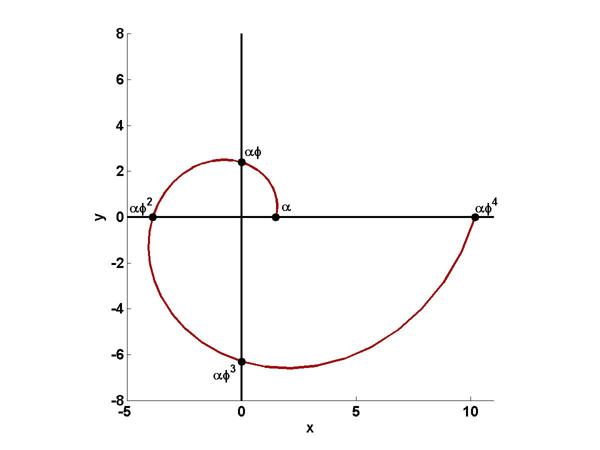Golden Spiral
A Golden Spiral is simulated by a continuously expanding sequence of golden rectangles and inscribed quarter circles.

Contents
Golden Rectangles
We begin with an animated .gif of an imitation Golden Spiral. You can see that removing a square from a golden rectangle leaves a smaller rectangle with the same shape. Connecting inscribed quarter circles produces a continuously expanding spiral. The aspect ratio of the rectangles is the golden ratio.
$$ \phi = \frac{1 + \sqrt{5}}{2} $$
A MATLAB function for generating these expanding golden rectangles and quarter circles is given at the end of this blog post, but this is not a true Golden Spiral.
True Golden Spiral
A logarithmic spiral is a curve given in polar coordinates by
$$ r = \alpha e^{\lambda \theta} $$
The angular coordinate $\theta$ must be multi-valued as the point circles around the origin multiple times. We get the particular logarithmic spiral known as the Golden Spiral by involving the golden ratio and setting
$$ \lambda = \frac{2}{\pi}{\ln{\phi}} $$
Then the radius is scaled powers of $\phi$, with integer powers as $\theta$ crosses the cartesian axes.
$$ r = \alpha \phi^{\frac{2}{\pi} \theta} $$
Here is the plot for $0 \le \theta \le 2 \pi$.

I do not see any obvious analytic way to specify the scale factor $\alpha$. By taking $\alpha$ = 1.48699214 the numeric values generated by the logarithmic Golden Spiral approach those generated by golden rectangles and inscribed quarter circles as the angle $\theta$ gets large.
golden_spiral.m
function golden_spiral % GOLDEN_SPIRAL Explosion of golden rectangles. % GOLDEN_SPIRAL Constructs a continuously expanding sequence % of golden rectangles and inscribed quarter circles.
% Copyright 2013 Cleve Moler % Copyright 2013 The MathWorks, Inc.
% Initialize_variables
% Golden ratio phi = (1+sqrt(5))/2;
% Control speed of zoom n = 256; f = phi^(1/n);
% Scaling a = 1; s = phi; t = 1/(phi+1);
% Centers x = 0; y = 0;
% A square us = [-1 1 1 -1 -1]; vs = [-1 -1 1 1 -1];
% Four quarter circles theta = 0:pi/20:pi/2; u1 = 2*cos(theta) - 1; v1 = 2*sin(theta) - 1; u2 = 2*cos(theta+pi/2) + 1; v2 = 2*sin(theta+pi/2) - 1; u3 = 2*cos(theta+pi) + 1; v3 = 2*sin(theta+pi) + 1; u4 = 2*cos(theta-pi/2) - 1; v4 = 2*sin(theta-pi/2) + 1;
initialize_graphics
% Loop
k = 0;
while get(klose,'value') == 0
if mod(k,n) == 0
power
switch mod(k/n,4)
case 0, right
case 1, up
case 2, left
case 3, down
end
end
zoom
k = k+1;
end
pause(1)
close(gcf)% ------------------------------------
function power
a = s;
s = phi*s;
t = phi*t;
end % power% ------------------------------------
function zoom
axis(f*axis)
drawnow
end % zoom% ------------------------------------
function right
x = x + s;
y = y + t;
line(x+a*us,y+a*vs,'color','black')
line(x+a*u4,y+a*v4)
end % right% ------------------------------------
function up
y = y + s;
x = x - t;
line(x+a*us,y+a*vs,'color','black')
line(x+a*u1,y+a*v1)
end % up% ------------------------------------
function left
x = x - s;
y = y - t;
line(x+a*us,y+a*vs,'color','black')
line(x+a*u2,y+a*v2)
end % left% ------------------------------------
function down
y = y - s;
x = x + t;
line(x+a*us,y+a*vs,'color','black')
line(x+a*u3,y+a*v3)
end % down% ------------------------------------
function initialize_graphics
clf reset
set(gcf,'color','white','menubar','none','numbertitle','off', ...
'name','Golden Spiral')
shg
axes('position',[0 0 1 1])
axis(3.5*[-1 1 -1 1])
axis square
axis off
line(us,vs,'color','black')
line(u3,v3)
klose = uicontrol('units','normal','position',[.04 .04 .12 .04], ...
'style','toggle','string','close','vis','on');
drawnow
end % initialize graphicsend % golden_spiral









Comments
To leave a comment, please click here to sign in to your MathWorks Account or create a new one.